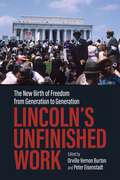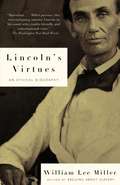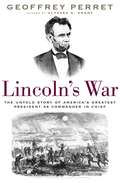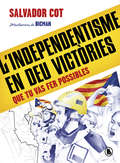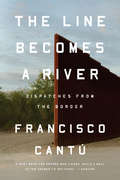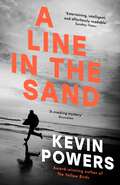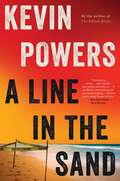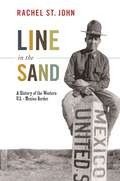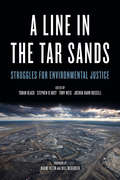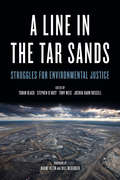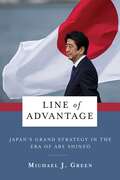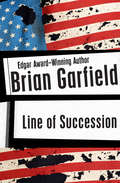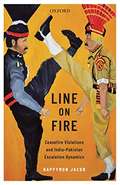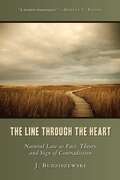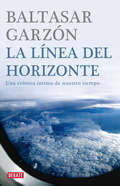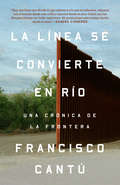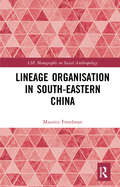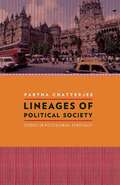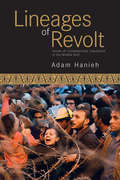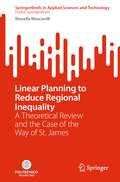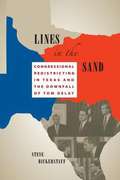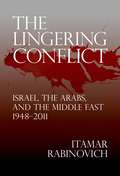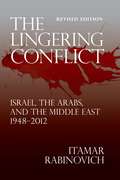- Table View
- List View
Lincoln’s Unfinished Work: The New Birth of Freedom from Generation to Generation
by Eric Foner Richard Carwardine Mark Schultz Jerald Podair Gavin Wright Stephen Kantrowitz William Haller J. William Harris Randall Stephens Joshua Casmir Catalano Greg Downs James Loewen Lawrence McDonnell Adrienne Petty Briana Pocratsky Rhondda ThomasIn his Gettysburg Address, Abraham Lincoln promised that the nation’s sacrifices during the Civil War would lead to a “new birth of freedom.” Lincoln’s Unfinished Work analyzes how the United States has attempted to realize—or subvert—that promise over the past century and a half. The volume is not solely about Lincoln, or the immediate unfinished work of Reconstruction, or the broader unfinished work of America coming to terms with its tangled history of race; it investigates all three topics.The book opens with an essay by Richard Carwardine, who explores Lincoln’s distinctive sense of humor. Later in the volume, Stephen Kantrowitz examines the limitations of Lincoln’s Native American policy, while James W. Loewen discusses how textbooks regularly downplay the sixteenth president’s antislavery convictions. Lawrence T. McDonnell looks at the role of poor Blacks and whites in the disintegration of the Confederacy. Eric Foner provides an overview of the Constitution-shattering impact of the Civil War amendments. Essays by J. William Harris and Jerald Podair examine the fate of Lincoln’s ideas about land distribution to freedpeople. Gregory P. Downs focuses on the structural limitations that Republicans faced in their efforts to control racist violence during Reconstruction. Adrienne Petty and Mark Schultz argue that Black land ownership in the post-Reconstruction South persisted at surprisingly high rates. Rhondda Robinson Thomas examines the role of convict labor in the construction of Clemson University, the site of the conference from which this book evolved. Other essays look at events in the twentieth and twenty-first centuries. Randall J. Stephens analyzes the political conservatism of white evangelical Christianity. Peter Eisenstadt uses the career of Jackie Robinson to explore the meanings of integration. Joshua Casmir Catalano and Briana Pocratsky examine the debased state of public history on the airwaves, particularly as purveyed by the History Channel. Gavin Wright rounds out the volume with a striking political and economic analysis of the collapse of the Democratic Party in the South.Taken together, the essays in this volume offer a far-reaching, thought-provoking exploration of the unfinished work of democracy, particularly as it pertains to the legacy of slavery and white supremacy in America.
Lincoln's Virtues: An Ethical Biography
by William Lee MillerWilliam Lee Miller's ethical biography is a fresh, engaging telling of the story of Lincoln's rise to power. Through careful scrutiny of Lincoln's actions, speeches, and writings, and of accounts from those who knew him, Miller gives us insight into the moral development of a great politician -- one who made the choice to go into politics, and ultimately realized that vocation's fullest moral possibilities. As Lincoln's Virtues makes refreshingly clear, Lincoln was not born with his face on Mount Rushmore; he was an actual human being making choices -- moral choices -- in a real world. In an account animated by wit and humor, Miller follows this unschooled frontier politician's rise, showing that the higher he went and the greater his power, the worthier his conduct would become. He would become that rare bird, a great man who was also a good man. Uniquely revealing of its subject's heart and mind, it represents a major contribution to our understanding and of Lincoln, and to the perennial American discussion of the relationship between politics and morality.
Lincoln's War: The Untold Story of America's Greatest President as Commander-In-Chief
by Geoffrey PerretThis is a readable and yet scholarly work which serves as both history and biography. "Incredible as it may seem to us, when Lincoln became president, there was still a question as to whether the president, even acting as commander in chief, had the power to determine military policy. It fell to Lincoln to create the role of commander in chief. This book tells how he did that and how, in so doing, he created the modern presidency."
L'independentisme en deu victòries (que tu vas fer possibles)
by Salvador CotUn recorregut, de la mà del Salvador Cot, per deu fites històriques on el poble unit marca un camí, un nou camí que tu també has fet possible. El 13 de setembre de 2009, unes dues mil cinc-centes persones passaven per una única urna a Arenys de Munt. Pocs dies més tard, el torero José Tomás triomfava a la Monumental de Barcelona. Era l'època del boicot al cava, a Espanya, amb un domini aclaparador dels vins de la Rioja al mercat interior català... Una Catalunya diferent a la d'ara amb, només, 21 diputats independentistes al Parlament que donaven suport a José Montilla. Ha passat una dècada llarga i Catalunya no és una república, això és cert. Però és molt més independent que a l'inici d'aquesta aventura política, econòmica i social. No hem guanyat, però tampoc no hem perdut. I en el caseller hi tenim victòries importants i permanents.
The Line Becomes a River: Dispatches from the Border
by Francisco Cantú"A must-read for anyone who thinks "build a wall" is the answer to anything." --EsquireFor Francisco Cantú, the border is in the blood: his mother, a park ranger and daughter of a Mexican immigrant, raised him in the scrublands of the Southwest. Haunted by the landscape of his youth, Cantú joins the Border Patrol. He and his partners are posted to remote regions crisscrossed by drug routes and smuggling corridors, where they learn to track other humans under blistering sun and through frigid nights. They haul in the dead and deliver to detention those they find alive. Cantú tries not to think where the stories go from there.Plagued by nightmares, he abandons the Patrol for civilian life. But when an immigrant friend travels to Mexico to visit his dying mother and does not return, Cantú discovers that the border has migrated with him, and now he must know the whole story. Searing and unforgettable, The Line Becomes a River goes behind the headlines, making urgent and personal the violence our border wreaks on both sides of the line
A Line in the Sand: A Novel
by Kevin PowersFROM THE AWARD-WINNING AUTHOR OF THE YELLOW BIRDS'Entertaining, intelligent, and effortlessly readable' Sunday Times'A stunning novel' New York Times'One of the best crime novels of the year' Irish Times'A cracking mystery' Guardian'Tense and enthralling' Daily Mail'Taut and enjoyable' Daily Telegraph'A kickass mystery from a superb storyteller' David Baldacci, author of The 6:20 Man'A spellbinding and totally original thriller' Philipp Meyer, author of The Son An early morning on a beach in Virginia. As he is taking his daily swim, Arman Bajalan - formerly an interpreter in Iraq - discovers a dead body. After surviving an assassination attempt that killed his wife and child, Arman has been given lonely sanctuary in the US. Now, sure that the murder is connected to his past, he knows he's still not safe.Seasoned detective Catherine Wheel and her fresh-off-the-beat partner have little to go on beyond a bus ticket in the man's pocket. It leads them to Sally Ewell, a local journalist as grief-stricken as Arman by the Iraq war, who is investigating a nefarious corporation: one on the cusp of landing a multi-billion-dollar government defence contract.As victims mount around Arman, taking the team down wrong turns and towards startling evidence, they find themselves in a race, committed to unravelling the truth and keeping Arman alive - even if it costs them everything.A Line in the Sand is a sinuous, powerful and white-knuckle thriller, from the award-winning author of The Yellow Birds, shot through with treachery, trauma and the long tentacles of war.
A Line in the Sand: A Novel
by Kevin PowersIn this &“spellbinding and totally original thriller&” (Philipp Meyer, author of The Son) a lonely veteran&’s gruesome discovery throws him right into the face of danger as a twisted investigation unravels the secrets of his dark past. One early morning on a Norfolk beach in Virginia, a dead body is discovered by a man taking his daily swim—Arman Bajalan, formerly an interpreter in Iraq. After narrowly surviving an assassination attempt that killed his wife and child, Arman has been given lonely sanctuary in the US as a maintenance worker at the Sea Breeze Motel. Now, convinced that the body is connected to his past, he knows he is still not safe. Seasoned detective Catherine Wheel and her newly minted partner have little to go on beyond a bus ticket in the dead man&’s pocket. It leads them to Sally Ewell, a local journalist as grief-stricken as Arman is by the Iraq War, who is investigating a corporation on the cusp of landing a multi-billion-dollar government defense contract. As victims mount around Arman, taking the team down wrong turns and towards startling evidence, they find themselves in a race, committed to unraveling the truth and keeping Arman alive—even if it costs them absolutely everything.
Line in the Sand: A History of the Western U.S.-Mexico Border (America in the World #11)
by Rachel St. JohnThe first transnational history of the U.S.-Mexico borderLine in the Sand details the dramatic transformation of the western U.S.-Mexico border from its creation at the end of the Mexican-American War in 1848 to the emergence of the modern boundary line in the first decades of the twentieth century. In this sweeping narrative, Rachel St. John explores how this boundary changed from a mere line on a map to a clearly marked and heavily regulated divide between the United States and Mexico. Focusing on the desert border to the west of the Rio Grande, this book explains the origins of the modern border and places the line at the center of a transnational history of expanding capitalism and state power in the late nineteenth and early twentieth centuries.Moving across local, regional, and national scales, St. John shows how government officials, Native American raiders, ranchers, railroad builders, miners, investors, immigrants, and smugglers contributed to the rise of state power on the border and developed strategies to navigate the increasingly regulated landscape. Over the border's history, the U.S. and Mexican states gradually developed an expanding array of official laws, ad hoc arrangements, government agents, and physical barriers that did not close the line, but made it a flexible barrier that restricted the movement of some people, goods, and animals without impeding others. By the 1930s, their efforts had created the foundations of the modern border control apparatus.Drawing on extensive research in U.S. and Mexican archives, Line in the Sand weaves together a transnational history of how an undistinguished strip of land became the significant and symbolic space of state power and national definition that we know today.
A Line in the Tar Sands: Struggles for Environmental Justice
by Black, Toban; D'Arcy, Stephen; Weis, Tony; Kahn Russell, Joshua; Klein, Naomi; McKibben, BillTar sands “development” comes with an enormous environmental and human cost. But tar sands opponents—fighting a powerful international industry—are likened to terrorists; government environmental scientists are muzzled; and public hearings are concealed and rushed. Yet, despite the formidable political and economic power behind the tar sands, many opponents are actively building international networks of resistance, challenging pipeline plans while resisting threats to Indigenous sovereignty and democratic participation. Featuring contributions from Winona LaDuke, Bill McKibben, Naomi Klein, Clayton Thomas-Muller, Harsha Walia, Jeremy Brecher, Crystal Lameman, Melina Laboucan-Massimo, Yves Engler, Cherri Foytlin, Macdonald Stainsby, Yudith Nieto, Greg Albo, Brian Tokar, Jesse Cardinal, Rex Weyler, Jess Worth, and many more. The editors’ proceeds from this book will be donated to frontline grassroots environmental justice groups and campaigns.
A Line in the Tar Sands: Struggles for Environmental Justice
by Joshua KahnThe fight over the tar sands in North America is among the epic environmental and social justice battles of our time, and one of the first that has managed to marry quite explicitly concern for frontline communities and immediate local hazards with fear for the future of the entire planet. Tar sands "development" comes with an enormous environmental and human cost. But tar sands opponents—fighting a powerful international industry—are likened to terrorists; government environmental scientists are muzzled; and public hearings are concealed and rushed. Yet, despite the formidable political and economic power behind the tar sands, many opponents are actively building international networks of resistance, challenging pipeline plans while resisting threats to Indigenous sovereignty and democratic participation. Including leading voices involved in the struggle against the tar sands, A Line in the Tar Sands offers a critical analysis of the impact of the tar sands and the challenges opponents face in their efforts to organize effective resistance. Contributors include Angela Carter, Bill McKibben, Brian Tokar, Christine Leclerc, Clayton Thomas-Muller, Crystal Lameman, Dave Vasey, Emily Coats, Eriel Deranger, Greg Albo, Jeremy Brecher, Jess Worth, Jesse Cardinal, Joshua Kahn Russell, Lilian Yap, Linda Capato, Macdonald Stainsby, Martin Lukacs, Matt Leonard, Melina Laboucan-Massimo, Naomi Klein, Rae Breaux, Randolph Haluza-DeLay, Rex Weyler, Ryan Katz-Rosene, Sâkihitowin Awâsis, Sonia Grant, Stephen D'Arcy, Toban Black, Tony Weis, Tyler McCreary, Winona LaDuke, and Yves Engler.
Line of Advantage: Japan’s Grand Strategy in the Era of Abe Shinzō (Contemporary Asia in the World)
by Michael GreenNo other country has devised a grand strategy for managing China’s rising economic and military power as deliberately or successfully as Japan. Seeking to counter Chinese ambitions toward regional hegemony, Japan has taken an increasingly assertive role in East Asia and the world. During the tenure of Prime Minister Abe Shinzo, the country pursued closer security cooperation with the United States and other democracies, established a more centralized national defense system, and advanced rules and norms to preserve the open regional order in the Indo-Pacific that is crucial to its prosperity and survival—all while managing an important economic relationship with China.In Line of Advantage, Michael J. Green provides a groundbreaking and comprehensive account of Japan’s strategic thinking under Abe. He explains the foundational logic and the worldview behind this approach, from key precedents in Japanese history to the specific economic, defense, and diplomatic priorities shaping contemporary policy toward China, the United States, the two Koreas, and the Indo-Pacific region. Drawing on two decades of access to Abe and other Japanese political, military, and business leaders, Green provides an insider’s perspective on subjects such as how Japan pursued competition with China without losing the benefits of economic cooperation. Assessing the strengths and weaknesses of Japan’s new active role, Line of Advantage sheds new light on a period with profound implications for the future of U.S. competition with China and international affairs in Asia more broadly.
Line of Succession
by Brian GarfieldFive bombs upend the foundation of the American governmentSturka is an artist with explosives. A sturdy man approaching middle age, he learned his trade on the darkest battlefields of the twentieth century: Indochina, Palestine, Guyana, Biafra, and the fetid jungles of South America, where he fought alongside Che Guevera but was quick enough not to die with him. He doesn&’t know where his new employers hail from; he only knows how well they pay. Today he packs plastic explosive into the false bottoms of three handbags and two suitcases, to be left at strategic locations around Washington, D.C. But this is no ordinary café bombing. Today Sturka targets the men at the top of the American government. The attack causes a crisis of succession, the likes of which America has never seen. If the right man doesn&’t take charge quickly, the country will tear itself apart.
Line On Fire: Ceasefire Violations And India-pakistan Escalation Dynamics (Oxford International Relations In South Asia)
by Happymon Jacob Sumit Ganguly E. SridharanThe India–Pakistan border in Jammu & Kashmir has witnessed repeated ceasefire violations (CFVs) over the past decade. As relations between India and Pakistan have deteriorated, CFVs have increased exponentially. It is imperative to gain a deeper understanding of these violations owing to their potential to not only cause a crisis but also escalate an ongoing one. Line on Fire, part of the Oxford International Relations in South Asia series, postulates that the incorrect diagnosis of the reasons behind CFVs has led to wrong policies being adopted by both India and Pakistan to deal with the recurrent violations. Using fresh empirical data and first-hand accounts, the volume attempts to understand the reason why CFVs continue to take place between India and Pakistan despite consistent efforts to reduce the tension between the two nations. In doing so, it recontextualizes and enriches the prevailing arguments in contemporary literature on escalating dynamics and unenduring ceasefire agreements between the two South Asian nuclear rivals.
The Line Through the Heart: Natural Law as Fact, Theory, and Sign of Contradiction
by J. BudziszewskiWhy do we demand happiness on terms that make happiness impossible? And what can we do about it? Acclaimed philosopher J. Budziszewski addresses these questions in the brilliantly persuasive book The Line Through the Heart, finding the answers in the natural law. The journey of exploration takes us through politics, religion, ethics, law, philosophy, and more, with Budziszewski as expert guide. While investigating the natural law and its implications, Budziszewski boldly confronts a wide range of contemporary issues, offering a newly integrated view of abortion, evolution, euthanasia, capital punishment, runaway courts, and the ersatz state religion built in the name of religious toleration. Written in Budziszewski's usual crystalline style, The Line Through the Heart shows that natural law is a matter of concern not merely to scholars but to everyone, for it touches how each of us lives, and how all of us live together. His profound examination of this subject helps us make sense of why habits that run against our nature have become second nature, and why our world seems to be going mad.
La línea del horizonte
by Baltasar GarzónLa línea del horizonte recoge la visión de Baltasar Garzón sobre los problemas del mundo actual. ¿Qué es la justicia universal y cómo surgió? ¿Cómo se pueden defender los derechos humanos y el respecto a las víctimas en las frágiles transiciones a la democracia? ¿Qué futuro le espera a América Latina? Entre 2005 y 2006, Baltasar Garzón disfrutó de una excedencia que pasó como profesor de la Universidad de Nueva York. Fue un período dedicado a la reflexión sobre estas y otras grandes preguntas del mundo actual, en parte a través de un ciclo de debates en que participaron personalidades de todo el mundo, desde Kissinger y Ernesto Zedillo hasta Felipe González, John Kerry, Antonio Muñoz Molina, Rosa Díez, José Saramago o el presidente Zapatero. Así es esta obra, un diálogo a muchas voces, trufado de recuerdos y anécdotas personales, en la que el juez Garzón pasa revista a los temas más cruciales: los derechos humanos, el terrorismo, la seguridad, el futuro de la comunicación, la economía, América Latina... Un repaso completo y apasionante de la mano de uno de los actores más interesantes de este mundo globalizado.
La línea se convierte en río: Una crónica de la frontera
by Francisco Cantú"Una mirada hermosa, ferozmente honesta y, sin embargo, profundamente empática con los que vigilan la frontera y los migrantes que arriesgan -y pierden- sus vidas atravesándola. En tiempos de retórica política a menudo mal informada o francamente engañosa, este libro es una correctivo invaluable ". --Phil KlayPara Francisco Cantú, la frontera está en la sangre: su madre, una guardaparques e hija de un inmigrante mexicano, lo crió en los matorrales del suroeste. Atormentado por el paisaje de su juventud, Cantú se une a la Patrulla Fronteriza. Él y sus compañeros son enviados a regiones remotas atravesadas por rutas de drogas y corredores de contrabando, donde aprenden a rastrear a otros humanos bajo un sol abrasador y noches frías. Arrastran a los muertos y entregan a detención a los que encuentran vivos. Cantú intenta no pensar como se desenvuelven las historias desde allí. Acosado por las pesadillas, abandona la Patrulla por la vida civil. Pero cuando un amigo inmigrante viaja a México para visitar a su madre agonizada y no regresa, Cantú descubre que la frontera ha migrado con él, y ahora debe conocer toda la historia. Ardiente e inolvidable, The Line Becomes a River convierte en urgente y personal la violencia que nuestra frontera desata en ambos lados de la línea.
La línea se convierte en río
by Francisco CantúUno de los diez mejores libros de 2018 según el Washington Post Nominado al premio Orwell en el Reino Unido Para Francisco Cantú, la frontera está en la sangre. Su madre, una guardabosques del Servicio Nacional de Parques, hija de un inmigrante mexicano, lo crió en los matorrales del suroeste. Atormentado por el paisaje de su juventud, Cantú se alistó a la Patrulla Fronteriza. Él y sus compañeros son enviados a regiones remotas atravesadas por rutas de contrabando de drogas y tráfico de personas, donde aprenden a rastrear a otros humanos bajo el sol abrasador y noches heladas, arrastrando muertos y entregando a los que encuentran vivos. Cantú intenta no pensar en el final de esas historias. Acosado por pesadillas, Cantú abandona la Patrulla por la vida civil. Pero cuando un amigo inmigrante viaja a México para visitar a su madre y no regresa, Cantú descubre que la frontera migró con el, y esta vez tiene que conocer toda la historia. Intenso e inolvidable, La línea se convierte en río hace que sintamos la violencia de ambos lados de nuestra frontera como algo inmediato y personal.
Lineage Organisation in South-Eastern China (LSE Monographs on Social Anthropology)
by Maurice FreedmanThis essay is the work of a social anthropologist but it is not based upon field work. It is concerned with Chinese matters but it is not written by a sinologue. In this essay are the author’s reflections on certain aspects of southeastern Chinese society during the last hundred and fifty years, with attention on the Fukien and Kwangtung region of China has it has specialized not only in large-scale unilineal organization but also in sending people overseas.
Lineages of Political Society: Studies in Postcolonial Democracy (Cultures of History)
by Partha ChatterjeePartha Chatterjee, a pioneering theorist known for his disciplinary range, builds on his theory of "political society" and reinforces its salience to contemporary political debate. Dexterously incorporating the concerns of South Asian studies, postcolonialism, the social sciences, and the humanities, Chatterjee broadly critiques the past three hundred years of western political theory to ask, Can democracy be brought into being, or even fought for, in the image of Western democracy as it exists today? Using the example of postcolonial societies and their political evolution, particularly communities within India, Chatterjee undermines the certainty of liberal democratic theory in favor of a realist view of its achievements and limitations. Rather than push an alternative theory, Chatterjee works solely within the realm of critique, proving political difference is not always evidence of philosophical and cultural backwardness outside of the West. Resisting all prejudices and preformed judgments, he deploys his trademark, genre-bending, provocative analysis to upend the assumptions of postcolonial studies, comparative history, and the common claims of contemporary politics.
Lineages of Revolt
by Adam HaniehWhile the outcomes of the tumultuous uprisings that continue to transfix the Arab world remain uncertain, the root causes of rebellion persist. Drawing upon extensive empirical research, Lineages of Revolt tracks the major shifts in the region's political economy over recent decades. In this illuminating and original work, Adam Hanieh explores the contours of neoliberal policies, dynamics of class and state formation, imperialism and the nature of regional accumulation, the significance of Palestine and the Gulf Arab states, and the ramifications of the global economic crisis. By mapping the complex and contested nature of capitalism in the Middle East, the book demonstrates that a full understanding of the uprisings needs to go beyond a simple focus on "dictators and democracy."
Linear Planning to Reduce Regional Inequality: A Theoretical Review and the Case of the Way of St. James (SpringerBriefs in Applied Sciences and Technology)
by Rossella MoscarelliThis book explores the advantages of a linear model of planning in reducing regional inequalities. Linear planning, commonly discussed in the past as a method which plans the development of the city, is completely redefined here in the form of a design approach inspired by projects shaped by linear routes, such as cycle or walking paths. Such concept is applied to the urgent topic of territorial marginality which specifically neglects rural and mountainous areas and recently is coped by European and National policies. The analysis of these policies demonstrates the necessity of alternative strategies equipped to deal with both the internal and external causes that determine the critical conditions in these fragile environments. By implementing the concept of linear planning in these contexts, this book proposes to enlarge the perspective of traditional policies contrasting the regional inequalities that usually determine the design of projects just within the boundaries of the marginal areas. Cycle and walking paths are experimental cases of linear planning as they have not been influenced or formed by political boundaries and therefore are able to equally involve both the central and marginal zones. This book presents a review of current issues such as regional inequalities, with attention to their related policies, as well as an analysis of the concept of linear planning as seen through the study of one of the most famous cases of a walking path—the Way of St. James in Spain.
Lines in the Sand
by Steve BickerstaffThe events of 2003 in Texas were important to the political history of this country. Congressman Tom DeLay led a Republican effort to gerrymander the state's thirty-two congressional districts to defeat all ten of the Anglo Democratic incumbents and to elect more Republicans; Democratic state lawmakers fled the state in an effort to defeat the plan. The Lone Star State uproar attracted attention worldwide. The Republicans won this showdown, gaining six additional seats from Texas and protecting the one endangered Republican incumbent. This outcome has undeniably affected national policy-making and has made it more difficult for Democrats to regain a majority in the U. S. House of Representatives. Some of the methods used by DeLay to achieve this result, however, led to his criminal indictment and ultimately to his downfall. With its eye-opening research, readable style, and insightful commentary, Lines in the Sand provides a front-line account of what happened in 2003, often through the personal stories of members of both parties and of the minority activist groups caught in a political vortex. Law professor Steve Bickerstaff provides much-needed historical perspective and also probes the aftermath of the 2003 redistricting, including the criminal prosecutions of DeLay and his associates and the events that led to DeLay's eventual resignation from the U. S. House of Representatives.
The Lingering Conflict
by Itamar RabinovichIn The Lingering Conflict Itamar Rabinovich, a former chief negotiator for Israel, provides unique and authoritative insight into the prospects for genuine peace in the Middle East. His presentation includes a detailed insider account of the peace processes of 1992-96 and a frank dissection of the more dispiriting record since then.Rabinovich's firsthand experiences as a negotiator and as Israel's ambassador to the United States provide a valuable perspective from which to view the major players involved. Fresh analysis of ongoing situations in the region and the author's authoritative take on key figures such as Ehud Barak and Benjamin Netanyahu shed new light on the long and tumultuous history of Arab-Israeli relations. His book is a shrewd assessment of the past and current state of affairs in the Middle East, as well as a sober look at the prospects for a peaceful future.While Rabinovich explains the conflict between Israel and the Palestinians-a classic dispute between two national movements claiming the same land- The Lingering Conflict also considers the broader political, cultural, and increasingly religious conflict between the Jewish state and Arab nationalism. He approaches the troubled region in an international context, offering provocative analysis of America's evolving role and evaluation of its diplomatic performance.This book builds on the author's previous seminal work on geopolitics in the Middle East, particularly Waging Peace. As Rabinovich brings the Arab-Israeli conflict up to date, he widens the scope of his earlier insights into efforts to achieve normal, peaceful relations. And, of course, he takes full account of recent social and political tumult in the Middle East, discussing the Arab Spring uprisings-and the subsequent retaliation by dictators such as Syria's al-Asad and Libya's Qaddafi-in the context of Arab-Israeli relations.
The Lingering Conflict
by Itamar RabinovichIn The Lingering Conflict Itamar Rabinovich, a former chief negotiator for Israel, provides unique and authoritative insight into the prospects for genuine peace in the Middle East. His presentation includes a detailed insider account of the peace processes of 1992-96 and a frank dissection of the more dispiriting record since then.Rabinovich's firsthand experiences as a negotiator and as Israel's ambassador to the United States provide a valuable perspective from which to view the major players involved. Fresh analysis of ongoing situations in the region and the author's authoritative take on key figures such as Ehud Barak and Benjamin Netanyahu shed new light on the long and tumultuous history of Arab-Israeli relations. His book is a shrewd assessment of the past and current state of affairs in the Middle East, as well as a sober look at the prospects for a peaceful future.While Rabinovich explains the conflict between Israel and the Palestinians-a classic dispute between two national movements claiming the same land- The Lingering Conflict also considers the broader political, cultural, and increasingly religious conflict between the Jewish state and Arab nationalism. He approaches the troubled region in an international context, offering provocative analysis of America's evolving role and evaluation of its diplomatic performance.This book builds on the author's previous seminal work on geopolitics in the Middle East, particularly Waging Peace. As Rabinovich brings the Arab-Israeli conflict up to date, he widens the scope of his earlier insights into efforts to achieve normal, peaceful relations. And, of course, he takes full account of recent social and political tumult in the Middle East, discussing the Arab Spring uprisings-and the subsequent retaliation by dictators such as Syria's al-Asad and Libya's Qaddafi-in the context of Arab-Israeli relations.
The Lingering Conflict
by Itamar RabinovichIn The Lingering Conflict Itamar Rabinovich, a former chief negotiator for Israel, provides unique and authoritative insight into the prospects for genuine peace in the Middle East. His presentation includes a detailed insider account of the peace processes of 1992-96 and a frank dissection of the more dispiriting record since then.Rabinovich's firsthand experiences as a negotiator and as Israel's ambassador to the United States provide a valuable perspective from which to view the major players involved. Fresh analysis of ongoing situations in the region and the author's authoritative take on key figures such as Ehud Barak and Benjamin Netanyahu shed new light on the long and tumultuous history of Arab-Israeli relations. His book is a shrewd assessment of the past and current state of affairs in the Middle East, as well as a sober look at the prospects for a peaceful future.While Rabinovich explains the conflict between Israel and the Palestinians--a classic dispute between two national movements claiming the same land-- The Lingering Conflict also considers the broader political, cultural, and increasingly religious conflict between the Jewish state and Arab nationalism. He approaches the troubled region in an international context, offering provocative analysis of America's evolving role and evaluation of its diplomatic performance.This book builds on the author's previous seminal work on geopolitics in the Middle East, particularly Waging Peace. As Rabinovich brings the Arab-Israeli conflict up to date, he widens the scope of his earlier insights into efforts to achieve normal, peaceful relations. And, of course, he takes full account of recent social and political tumult in the Middle East, discussing the Arab Spring uprisings--and the subsequent retaliation by dictators such as Syria's al-Asad and Libya's Qaddafi--in the context of Arab-Israeli relations.
